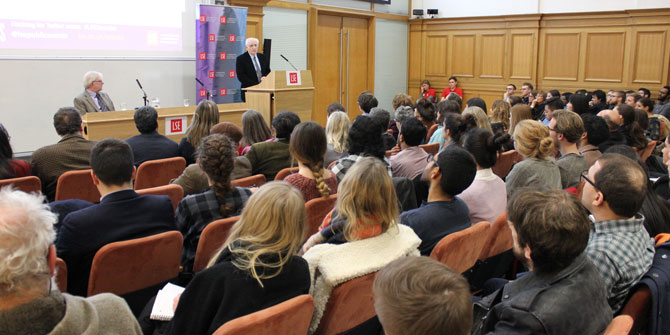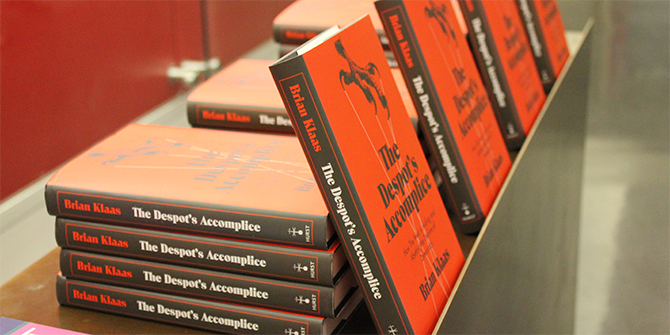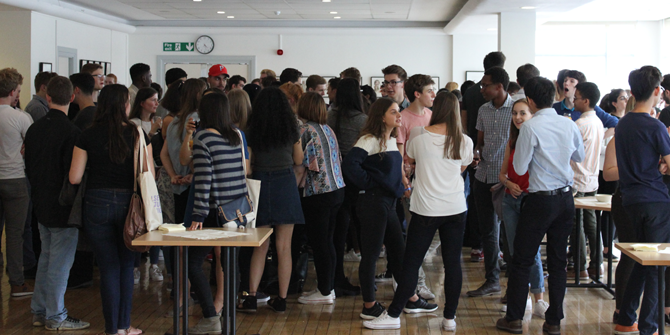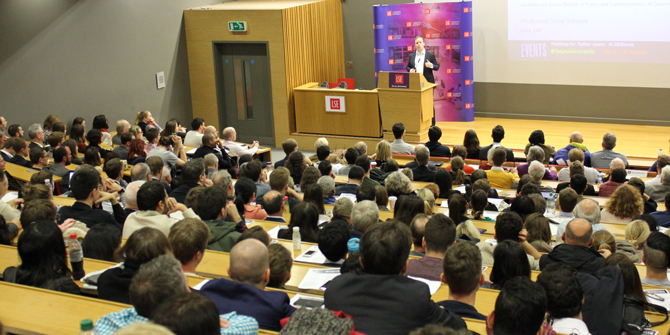MSc student Pia Morar reviews the recent Department of Government public lecture, held in memory of Anthony Smith, at LSE on Thursday 9 February 2017 with speaker Professor Sammy Smooha. Listen to the podcast recording of the event.
How Do Western Democracies Cope with the Challenge of Diversity?
On Thursday 9 February, the first of a series of lectures in memory of Anthony Smith was launched at LSE. Anthony Smith was a foundational figure in the study of nationalism; his key contribution was in the study of ethnic nationalism. The lecture was delivered by Professor Sammy Smooha, Professor Emeritus of Sociology at the University of Haifa, who is working as a visiting scholar at the University of London SOAS for the 2016-2017 academic year. Smooha sadly admitted that one of his first thoughts upon accepting his appointment was the proximity he thought he would have to his dear friend Anthony, who sadly passed away in 2016.
The lecture topic was focused on different approaches the West has undertaken in its encounter with ethnically diverse immigrants and minorities. Smooha tracked the historical record of Western liberal democracies in their apparent multicultural approach, and evaluated the successes and failures of these policies, focusing primarily on the United States. Smooha presented a rather critical view of the West’s method. He began by outlining the way diversity enriches society, but then quickly explained how diversity was historically regarded “as a burden” in confrontation with the West’s main ideological tenants of liberalism and nationalism. In the past differences have been eliminated through genocide, assimilation, or population control. These policies were practiced in the US up until the 1970s, when multiculturalism became the new buzzword. Nevertheless, true multiculturalism is not practiced in the US to this day, argued Smooha, as seen with reluctance to integrate non-white immigrants, or the granting of collective group rights to ethnic minorities. He terms this phenomenon ‘multi-subculturalism’, which basically entails variations of the same culture.
The rights of the majority
In Europe, however, the problem is (becoming increasingly) more severe, Smooha determined. Here the ‘rights of the majority’ have become the new focal point. The European state system was not built on an immigration framework and therefore struggles to embrace multiculturalism. An alternative model for certain European states is the consociational democracy, which institutionalises power-sharing via federalism and regional autonomy. States like Belgium and Switzerland embrace this model, which allows for relatively equal power-sharing. Smooha then described his own contribution, the concept of the ‘ethnic democracy’, which is prevalent in Estonia and Slovakia. In this system, the majority rules over the minority. The ethnic minority is granted equal individual rights, with limited collective rights are partially attainable through a democratic struggle. Overall then the West has made improvements to integrate immigrants from non-Western countries, however, the shift to a consociational model has not occurred. In fact, Smooha does not expect the West to continue with this process, as there is already a backlash against new immigrants. Smooha finishes where he started, emphasising the rise in nationalism that is counteracting the rising diversity. This, he poses, will be the new challenge to overcome.
Sammy Smooha doesn’t pull any punches
Smooha’s speaking style was dynamic and engaging. He adamantly expressed outrage at how ethnic minorities have been abused in the US and Europe. His lecture was followed by numerous questions, of which, due to time constraints, only a fraction could be answered. When a member of the audience prompted him to offer a normative view on the ‘rights of the majority’ Smooha stated that there is no clear answer: it depends which rights are demanded. The majority has, in his view, the right to control immigration in Germany and Britain, which are not traditional immigration countries. But once the immigrants are granted admittance they must be treated equally, Smooha argued. For example, in Paris, “it does not bother me when a Muslim woman wears a burka. But it would be an issue if they wanted publically funded schools in Arabic.” In this context he adamantly emphasised the need for discussion and negotiation.
In a similar manner Smooha addressed a question concerning the rising resistance to immigration in the West. The problem for him lies in the perceived threat of Islam, which is caused by the few Muslims who align with radical groups such as ISIS. He stated that this then results in the misconception that Muslim immigrants in general threaten the rights of the majority, prompting them to seek greater control. Despite some confusion among the audience – one member of the audience indignantly left the hall over this point – Smooha emphasised the inaccurate conception of Islam in the West, rather than an actual danger.
The event turnout was strong, particularly among the nationalism scholarly community, with academics such as John Breuilly attending and of course Professor John Hutchinson hosting the event. The content of the lecture was straight forward and clear, placing ethnic diversity within the clear framework of western liberal, consociational, and ethnic democracies, while highlighting the key debates and issues in present politics. A more detailed elaboration of Smooha’s own concept of ethnic democracy in the context of Israel was perhaps amiss, given his expertise in the field; one would perhaps expect him to mention it at least in passing. But perhaps Smooha believed the topic to be outside the scope of the lecture. The general debate and historical background was presented in a comprehensible manner, leaving the audience with an enriched understanding of ethnic diversity and its accompanying challenges. It seems the only true complaint was that there was not enough time to answer the multitude of questions seeking elaboration of the Smooha’s bold arguments.
 Pia Morar is an MSc Comparative Politics student in the LSE Department of Government. Before joining LSE Pia completed her undergraduate degree in Political Science at the University of Toronto in Canada. Pia is interested in nationalism and ethnic conflicts, and will be writing her dissertation on the Kurdish question in Turkey and the Kurdish diaspora.
Pia Morar is an MSc Comparative Politics student in the LSE Department of Government. Before joining LSE Pia completed her undergraduate degree in Political Science at the University of Toronto in Canada. Pia is interested in nationalism and ethnic conflicts, and will be writing her dissertation on the Kurdish question in Turkey and the Kurdish diaspora.
Note: this article gives the views of the author, and not the position of the LSE Department of Government, nor of the London School of Economics.






